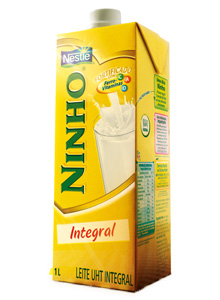 NEW BIOPLASTIC CAP: Ninho carton with the NEW BIOPLASTIC CAP: Ninho carton with the new cap made from sugar cane-derived plastic |
Nestlé Brazil is to launch bioplastic caps for its popular milk brands Ninho and Molico illustrating the Company’s commitment to the use of packaging materials from renewable resources. From August, the new caps made from sugar cane-derived plastic will be used for Nestlé’s UHT and ready-to-drink milk products in the country.
Currently, Nestlé is involved in over 30 projects to introduce bioplastics in its product packaging portfolio worldwide.
Ivan Zurita, President of Nestlé Brazil, emphasised that using conventional plastics made from renewable resources for its products marks a significant landmark, not only for the Company, but the food and beverage packaging industry as a whole.
He said: “This is an innovating initiative that adds further value to our products. Our participation in this project is fully aligned with our global social responsibility platform called Creating Shared Value, where it can best create value both for society and shareholders, and the communities where it operates.”
In partnership with Tetra Pak and Braskem, Nestlé’s milk products which will use the new bioplastic caps and are contained in Tetra Brik® aseptic packaging include Ninho, Ninho Levinho, Ninho Low Lactose and Molico.
Carlos Fadigas, President for Braskem, Brazil’s largest petrochemical company, backed the joint collaboration with Nestlé to advance the use of packaging from renewable resources, and said: “We are very proud to take part in initiatives alongside with companies that are global leaders in their segments. As the largest worldwide producer of biopolymers, we are fully involved in the commitment to promoting sustainability.”
Paulo Nigro, President for Tetra Pak in Brazil, an international food processing and packaging solutions company, added: “The use of polyethylene made out of a renewable raw material is another important step towards our goal of achieving 100% renewable packaging.”
In addition, the paper used for the production of Nestlé’s milk brand cartons in Brazil comes from forests managed in alignment with the responsible forestry management principles, certified by Forest Stewardship Council.
Going one beyond
The introduction of bioplastic caps in Brazil follows on from the launch earlier this year of Nestlé Purina’s renewable resource pet food packaging for its brand One BeyOnd in the United States.
Nestlé Purina was the first pet food company to use over 90% of renewable materials in its product packaging bags. Soya inks are used for illustration on the outside of the One BeyOnd brand bags, together with a bioplastics lining on the inside made from corn-derived plastic.
Source
Nestlé, press release, 2011-07-29.
Supplier
Braskem
Nestle
Tetra Pak International S.A.
Share
Renewable Carbon News – Daily Newsletter
Subscribe to our daily email newsletter – the world's leading newsletter on renewable materials and chemicals










